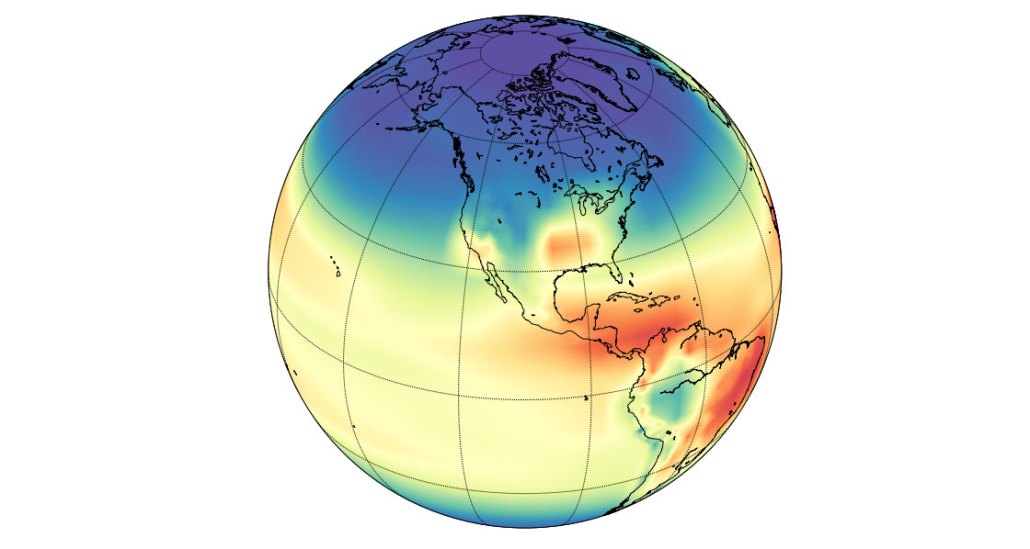
RADICAL THEORY Changes in the concentration of a highly reactive compound in the atmosphere called hydroxyl may be to blame for a rise in global methane levels since 2007, new research suggests. Redder regions in this simulation of a typical March hydroxyl distribution contain higher concentrations of the molecule.
Angharad Stell/Univ. of Bristol
A recent upsurge in planet-warming methane may not be caused by increasing emissions, as previously thought, but by methane lingering longer in the atmosphere.
That’s the conclusion of two independent studies that indirectly tracked concentrations of hydroxyl, a highly reactive chemical that rips methane molecules apart. Hydroxyl levels in the atmosphere decreased roughly 7 or 8 percent starting in the early 2000s, the studies estimate.
The two teams propose that the hydroxyl decline slowed the breakdown of atmospheric methane, boosting levels of the greenhouse gas. Concentrations in the atmosphere have crept up since 2007, but during the same period, methane emissions from human activities and natural sources have remained stable or even fallen slightly, both studies suggest. The research groups report their findings online April 17 in Proceedings of the National Academy of Sciences.
“If hydroxyl were to decline long-term, then it would be bad news,” says Matt Rigby, an atmospheric scientist at the University of Bristol in England who coauthored one of the studies. Less methane would be removed from the atmosphere, he says, so the gas would hang around longer and cause more warming.
The stability of methane emissions might also vindicate previous studies that found no rise in emissions. The Environmental Protection Agency, for instance, has reported that U.S. emissions remained largely unchanged from 2004 to 2014 (SN Online: 4/14/16).
Methane enters the atmosphere from a range of sources, from decomposing biological material in wetlands to leaks in natural gas pipelines. Ton for ton, that methane causes 28 to 36 times as much warming as carbon dioxide over a century.
Since the start of the Industrial Revolution, atmospheric methane concentrations have more than doubled. By the early 2000s, though, levels of the greenhouse gas inexplicably flatlined. In 2007, methane levels just as mysteriously began rising again. The lull and subsequent upswing puzzled scientists, with explanations ranging from the abundance of methane-producing microbes to the collapse of the Soviet Union.
Those proposals didn’t account for what happens once methane enters the atmosphere. Most methane molecules in the air last around a decade before being broken apart during chemical reactions with hydroxyl. Monitoring methane-destroying hydroxyl is tricky, though, because the molecules are so reactive that they survive for less than a second after formation before undergoing a chemical reaction.
Neither study can show conclusively that hydroxyl levels changed, notes Stefan Schwietzke, an atmospheric scientist at the National Oceanic and Atmospheric Administration’s Earth System Research Laboratory in Boulder, Colo. The papers nevertheless add a new twist in explaining the mysterious methane rise, he says. “Basically these studies are opening a new can of worms, and there was no shortage of worms.”
Despite being conducted by two separate teams — one headed by Rigby and the other by atmospheric scientist Alex Turner of Harvard University — the new studies used the same roundabout approach to tracking hydroxyl concentrations over time.
Both teams followed methyl chloroform, an ozone-depleting substance used as a solvent before being banned by the Montreal Protocol. Like methane, methyl chloroform also breaks apart in reactions with hydroxyl. Unlike methane, though, emission rates of methyl chloroform are fairly easy to track because the chemical is entirely human-made.
Examining methyl chloroform measurements gathered since the 1980s revealed that hydroxyl concentrations have probably wobbled over time, contributing to the odd pause and rise in atmospheric methane concentrations. But to know for sure whether hydroxyl levels varied or remained steady, scientists will need to take a more detailed look at regional emissions of methane and methyl chloroform, Rigby says.
Why hydroxyl levels might have fallen also remains unclear. Turner and colleagues note that the ban on ozone-depleting substances like methyl chloroform might be the cause. The now-recovering ozone layer (SN: 12/24/16, p. 28) blocks some ultraviolet light, an important ingredient in the formation of hydroxyl. Identifying the cause of the hydroxyl changes could help climate scientists better predict how methane levels will behave in the future.







